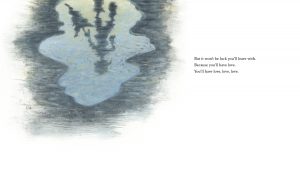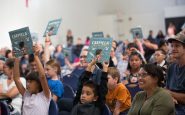Dear Teachers #13
Homebound Letter 13 – May 5, 2020
Dear Teacher:
When I was in high school, a teacher changed the trajectory of my life – though I was unable to see it that way at the time. It happened at the end of my 11th grade year. I was a basketball player. A basketball NERD really. I didn’t go to parties or anything like that. I just played ball. I was a working-class half Mexican kid who dreamed of getting a hoop scholarship. My world was pretty narrow. During our last class session, my English teacher gave everyone the final . . . except for me. She skipped right past my desk and went onto the next person. I was confused. I watched everyone else furiously get to work – we only had two hours to complete the test.
I hesitantly raised my hand, saying, “Uh, Mrs. Blizzard, I didn’t get the test.”
She nodded and held up a hand, saying, “Hang on, Mr. de la Peña.” I watched her go over to her desk and pull open a drawer and pull out several blank sheets of paper. She then walked over to me, put the papers on my desk and whispered in my ear, “I gave you an A on the test. All I want you to do is write whatever comes to mind for the next two hours.”
I was baffled by this. As she walked away I remember thinking, Man, this lady’s weird. But then a more pragmatic part of me thought, Screw it, I got an A.
And I started writing.
I remember writing about the first thing that popped into my head – the girl I was dating at the time. She was a foreign exchange student from France and didn’t speak English. I didn’t speak French. (I’m pretty sure we were dating). Every day we’d sit across from each other at lunch and just sort of stare at each other. Sometimes we’d even hold hands. I wrote about how it was the best relationship of my life. How when I got older I was going to marry someone from another country. And we were never going to learn each other’s language. And then when we had a kid, he or she would speak English. It was silly and probably not as funny as I thought at the time. But that’s who I was at sixteen. And that’s what I wrote.
By the end of the two hours I had those 12 pages filled up with my story. As I went to leave the classroom at the end of the period, I tried to hand the pages to the teacher. But she stopped me. She asked me to hang on a minute. Once everyone else had left the room she turned back to me and said, “Do you know why I did that?” I shrugged and told her the truth. “No.” She smiled. “I did it because you’re a really good writer. And I couldn’t wait to see what you’d come up with if you had two straight hours to write.”
I left her classroom that day, thinking, “Yep, it’s confirmed. That lady’s definitely weird.”
I didn’t think of her again until two years later, when I was a sophomore in college. Basketball had gifted me a free education at a great university – a dream come true! – but I quickly realized I wasn’t good enough to play beyond college. Division 1 basketball was my ceiling. I wasn’t going to play in the NBA or even overseas. So what was going to become of me after college? I would sit in my room and think about this for hours. That’s about the time when my 11th grade English teacher came back into my head. Miss Blizzard thinks I’m a good writer, I remember thinking. I wonder if I could ever do something with that.
Well, what Miss Blizzard couldn’t have known back then, was that I had been secretly writing spoken word poetry all through junior high and high school. I say secretly because I never showed a single poem to another living soul. I used to think of myself as a spoken word poet who spoke my poems to no one. Why? Because I didn’t think guys were supposed to write poetry. Wasn’t that too sensitive? Too soft? Poetry didn’t vibe with the machismo code I was raised under. But secretly I loved it. Secretly it helped me understand how I felt about the world. How I felt about myself.
The moral of the story. I wrote as a kid because I felt a need to express myself. But I never took my writing seriously. Not until someone in a position of intellectual authority – and just as importantly, someone I looked up to – suggested I may have talent. That was when my creative secret first became a real-world possibility. Though I didn’t recognize it as such right away.
Never underestimate the power of suggestion.
That is what I want to tell you today. The best teachers have a kind of pedagogical humility. They understand that some of the greatest moves they will ever make as a teacher . . . they won’t be around to see the payoff.
Sometimes the seeds you plant today won’t bloom until LONG after your students have left your orbit. That’s what happened with me and Miss Blizzard. But maybe that’s the most beautiful part of being a teacher. Not seeing the fruits of your labor. But the humble, quiet seeding.
Dear Teacher,
You are being asked to do the impossible right now. You are being asked to translate the magic that happens in a classroom – with in-person energy and eye contact – and translate it into some kind of grainy copy of a copy, transmitted onto your student’s dinged-up chrome book as she sits at her kitchen table next to her annoying little brother, with the TV on in the background. Impossible. And no grand plan from the powers that be. Yet you keep showing up, day after day. You keep trying to reach your young people.
A couple weeks ago my daughter turned six. The day after her birthday I found a wrapped gift on our front porch. At first I sort of kicked at it a little (because, you know, Corona). But then I saw the card. When I told my daughter it was a gift from her kindergarten teacher, she smiled bigger than I’d seen her smile since her elementary school shuttered its doors. Which made me and her mom smile just as big. Maybe that’s what your students will carry with them long after Covid-19. Not sight words or fractions or chemical properties. But that you found a way to see them in this scary time. That you kept trying. That you cared about how they were doing.
Dear Teacher,
Most of the time when I’m asked to give a talk at a big conference for teachers I tell the story of me and my dad and our respective journeys to literacy and literature. I talk about how I went from a reluctant-reading hoop head to an aspiring writer and avid reader because of one book, The Color Purple. And I talk about how my dad went from quiet, working-class, traditional machismo Mexican father to a 3rd grade teacher because of one book, One Hundred Years of Solitude. What I don’t often get into (because the idea I’m most consumed with these days is the misconceptions of masculinity within working-class communities) is that my mom is a teacher, too. 4th grade. And my two sisters are teachers, too – one is a reading specialist, the other is a newly-minted special ed teacher. That means all five of us are educators. Pretty cool, right? We’re all in the same boat as you these days.
Dear Teacher,
There’s a boy on your Zoom screen. His head is slightly bowed – though he sometimes engages. He’s gripping his hand-me-down phone, the one with the spidered screen. Always with the damn phone. He comes off as hard – though he sometimes concedes a restrained smile. Back when school was still open, you almost mistook him for one of the cool kids, but when you looked closely enough, you’d have seen his hair wasn’t quite right, his clothes a beat behind the style. And though he ran with the charismatic crew, he was never the one telling the joke, telling the story. He was never the one initiating the plan. Mostly he was just quiet. Mostly he was just drifting along with the tide.
This is the boy I want to tell you about. The “young man,” I should say – he’s actually passing from one thing to another as he sits through your Zoom session.
He may be difficult to see, but he’s desperate to be seen. He may come off as hard to reach, but he needs so badly for someone to reach him. That someone could be you. But there’s a catch. . . .
It is not possible to know if or when you have succeeded.
As I mentioned before, here is an instance where you may have to exercise a little pedagogical humility. Because the seeds you plant during this time of distance learning are unlikely to bloom until long after this young man has passed through your life. In fact, it may seem like the more you try, the more he bristles. The more he retreats. Try to verbally engage him in the group and he will mostly shrug his shoulders. He will mostly respond to your questions with, “I don’t know.” He will avoid eye contact and respectfully shut down ANYTHING that sniffs of advocacy.
But please, please, please don’t react to any of this posturing with your ego. This is only a ill-fitting costume he wears. This is the front he’s been taught to construct by a slowly dying doctrine of what it means to be a man. In truth, no one you teach needs you more. And while many of your top performing students log on to learn, this young man logs on to be loved. At least partly. (Though he will not be conscious of this until long after he graduates high school, and then college, until he moves clear across the country and has a lonely intellectual awakening and begins writing melancholy stories about young men like himself). What you can’t know as he attempts to float through this time of online learning is all that he carries on his shoulders. Poverty. Educational insecurity. An angry, hardworking father who sweeps silently through the house like a ghost. A mother who bends to this haunting in order to pretend harmony. A profound sadness that hovers like a gas in every room the young man enters.
Please see this young man, who is mostly still a boy. Please believe in him. Please hold him accountable and don’t let him coast. Please tell him to put away his phone. Please love him from the most honest place in your heart. Because you may be his best chance of becoming something more than he believes is possible.
Dear Teacher,
During these crazy-ass Coronavirus times, you shouldn’t strive to be the perfect teacher. You should strive to be the right kind of imperfect teacher.
Your friend,
Matt




